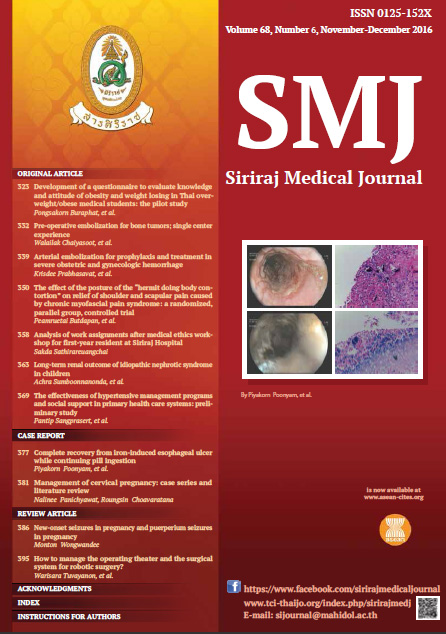Longterm Renal Outcome of Idiopathic Nephrotic Syndrome in Children
Keywords:
Idiopathic nephrotic syndrome, steroid sensitive nephrotic syndrome, steroid resistant nephrotic syndrome, focal segmental glomerulosclerosis, end-stage renal disease, chronic kidney diseaseAbstract
Objective: To study longterm renal outcome of Thai children with idiopathic nephrotic syndrome (INS).
Methods: We retrospectively reviewed 75 INS children followed-up in a tertiary care, university hospital. Male to female ratio was 2:1. Mean age at diagnosis was 6.2 years, and 56.0% were less than 5 years old. 57.3% previously received prednisolone from other hospitals and 32 patients (42.7%) were steroid resistant nephrotic syndrome (SRNS). Initial short stature was found in 1.3%. Hypertension and hematuria was found in 34.7% and 14.7%, respectively. Renal biopsy performed in 40 patients (53.3%) revealed minimal changes disease in 17 (42.5%), focal and segmental glomerulosclerosis (FSGS) in 12 (30.0%), mesangial proliferative glomerulonephritis in 5 (12.5%), IgM nephropathy in 4 (10%), and IgA nephropathy in 2 (5%) patients. Immunosuppressive medications included Cyclophosphamide in 64.5%, Tacrolimus in 14.7%, Cyclosporin in 8.0% and Mycophenolate mofetil in 4.0%. Enalapril was given in 48.0%.
Results: Mean follow-up time was 7.4 years. Complete remission was achieved in 77.3%. One patients (1.3%) had Chronic Kidney Disease stage 3 and 5 patients (6.7%) had End Stage Renal Disease (ESRD). One patient with ESRD died of severe respiratory tract infection. The factor associated with poor renal outcome was FSGS (p=0.032). Renal survival at 5,10, and 15 years were 95.3%, 85.7% and 57.2%, respectively. At last follow-up, short stature was found in 4.0% and hypertension in 20.0%. Other complications included cataract (29.3%), glaucoma (9.3%), diabetes mellitus (2.6%), septicemia (9.3%), other infections (10.6%).
Conclusion: We suggest that although renal outcome in Thai children may be better than in caucasian, longterm follow up is still needed, especially in children with FSGS.
Downloads
Published
How to Cite
Issue
Section
License
Authors who publish with this journal agree to the following conditions:
Copyright Transfer
In submitting a manuscript, the authors acknowledge that the work will become the copyrighted property of Siriraj Medical Journal upon publication.
License
Articles are licensed under a Creative Commons Attribution-NonCommercial-NoDerivatives 4.0 International License (CC BY-NC-ND 4.0). This license allows for the sharing of the work for non-commercial purposes with proper attribution to the authors and the journal. However, it does not permit modifications or the creation of derivative works.
Sharing and Access
Authors are encouraged to share their article on their personal or institutional websites and through other non-commercial platforms. Doing so can increase readership and citations.











